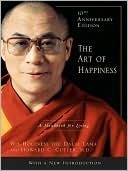More on this book
Community
Kindle Notes & Highlights
Read between
August 12 - September 14, 2022
But once these basic needs are met, the message is clear: we don’t need more money, we don’t need greater success or fame, we don’t need the perfect body or even the perfect mate – right now, at this very moment, we have a mind, which is all the basic equipment we need to achieve complete happiness.
If you maintain a feeling of compassion, loving kindness, then something automatically opens your inner door. Through that, you can communicate much more easily with other people. And that feeling of warmth creates a kind of openness. You’ll find that all human beings are just like you, so you’ll be able to relate to them more easily.
‘Whenever I meet people I always approach them from the standpoint of the most basic things we have in common. We each have a physical structure, a mind, emotions. We are all born in the same way, and we all die. All of us want happiness and do not want to suffer. Looking at others from this standpoint rather than emphasizing secondary differences such as the fact that I am Tibetan, or a different color, religion, or cultural background, allows me to have a feeling that I’m meeting someone just the same as me. I find that relating to others on that level makes it much easier to exchange and
...more
But some part of us may still seek to regress to an earlier state of existence, a state of bliss in which there is no feeling of isolation, no feeling of separation. Many contemporary psychologists feel that the early ‘oneness’ experience is incorporated into our subconscious mind, and as an adult it permeates our unconscious and private fantasies. They believe that the merging with the loved one when one is ‘in love’ echoes the experience of being merged with the mother in infancy. It recreates that magic feeling, a feeling of omnipotence, as if all things are possible. A feeling like that is
...more
Another survey by Allan Luks, conducted with several thousand people who were regularly involved in volunteer activities that helped others, revealed that over 90 per cent of these volunteers reported a kind of ‘high’ associated with the activity, characterized by a feeling of warmth, more energy, and a kind of euphoria. They also had a distinct feeling of calmness and enhanced self-worth following the activity.
Begin by visualizing a person who is acutely suffering, someone who is in pain or is in a very unfortunate situation. For the first three minutes of the meditation, reflect on that individual’s suffering in a more analytic way – think about their intense suffering and the unfortunate state of that person’s existence. After thinking about that person’s suffering for a few minutes, next, try to relate that to yourself, thinking, “That individual has the same capacity for experiencing pain, joy, happiness, and suffering that I do.” Then, try to allow your natural response to arise – a natural
...more
But at that moment, if you can look at the situation from another angle and realize that this very body . . .’ he slapped an arm in demonstration, ‘is the very basis of suffering, then this reduces that feeling of rejection – that feeling that somehow you don’t deserve to suffer, that you are a victim.
On the other hand, if your basic outlook accepts that suffering is a natural part of your existence, this will undoubtedly make you more tolerant towards the adversities of life.
Within a Buddhist context, when one reflects on the fact that one’s ordinary day-to-day existence is characterized by suffering, this serves to encourage one to engage in the practices that will eliminate the root causes of one’s suffering. Otherwise, if there was no hope, or no possibility of freedom from suffering, mere reflection on suffering just becomes morbid thinking, and would be quite negative.’
‘We also often add to our pain and suffering by being overly sensitive, overreacting to minor things, and sometimes taking things too personally. We tend to take small things too seriously and blow them up out of proportion, while at the same time we often remain indifferent to the really important things, those things which have profound effects on our lives and long-term consequences and implications.
Lusseyran stated, ‘Unhappiness, I saw then, comes to each of us because we think ourselves at the center of the world, because we have the miserable conviction that we alone suffer to the point of unbearable intensity. Unhappiness is always to feel oneself imprisoned in one’s own skin, in one’s own brain.’


